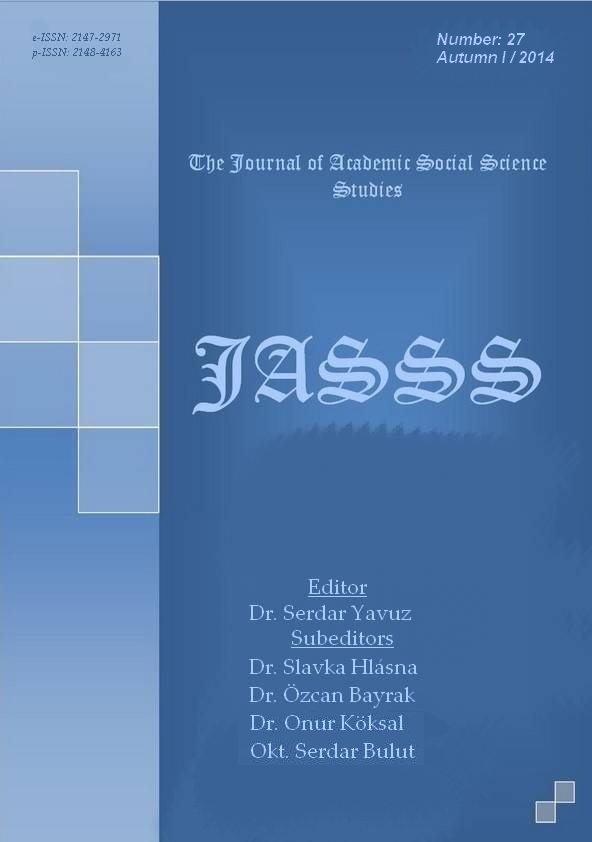SINIF ÖĞRETMENLERİNİN DEĞERLER EĞİTİMİNE YÖNELİK TUTUMLARININ ÇEŞİTLİ DEĞİŞKENLER AÇISINDAN İNCELENMESİ
Author :
Abstract
Bu çalışma, sınıf öğretmenlerinin okullarda uygulanmakta olan değerler eğitimine ilişkin tutumlarını belirlemek amacıyla yapılmıştır. Milli Eğitim Bakanlığı’nın 2010 yılında yayınlamış olduğu ilk ders genelgesi, okullarda değerler eğitimi çalışmalarının resmileşmesi ve yaygınlaştırılması bakımından adeta bir milat olmuştur. Fakat şu bilinen bir gerçektir ki herhangi bir programın benimsenmesi ya da başarılı bir şekilde uygulanmasında öğretmen kilit rol oynamaktadır. Bu amaçla sınıf öğretmenlerinin değerler eğitimine ilişkin tutumlarını ortaya koyma gerekliliği doğmuştur. Değerler eğitimine yönelik tutumu olumlu olan öğretmenlerin değerler eğitimini daha etkin olarak uygulayacağı umulmaktadır. Sınıf öğretmenlerinin değerler eğitimine ilişkin tutumlarını ve bu tutumun çeşitli değişkenler bakımından farklılaşma durumunu belirlemek için araştırmacı tarafından değerler eğitimi ile ilgili 25 maddeden oluşan “Değerler Eğitimi Tutum Ölçeği” geliştirilmiş ve uygulanmıştır. Yapılan bu çalışma tarama modelinde olup betimsel bir nitelik taşımaktadır. Çalışmanın evrenini Bingöl il merkezindeki ilkokullarda görev yapmakta olan sınıf öğretmenleri oluşturmaktadır. Sınıf öğretmenlerinin tamamına ulaşılmış, gönüllülük esasına göre veri toplama aracı dağıtılmıştır. Buna göre 162 sınıf öğretmeni ölçeği doldurmuş ve dönüt sağlamıştır. Bu ölçeklerden dört tanesi ilk incelemelerde yanlış ya da eksik doldurulduğu için elenmiş, analizler 158 öğretmenin doldurduğu ölçekler üzerinden yapılmıştır. Ölçeğe ait iç güvenirlik katsayısı Cronbach alpha ile hesaplanmış ve .92 olarak bulunmuştur. Verilerin analizinde; kişisel bilgiler yüzde ve frekans kullanılmıştır. Ölçek puanlarının dağılımı incelenmiş ve dağılımın parametrik olmadığı belirlenmiştir. Dolayısıyla, ölçekten alınan puanların çeşitli değişkenler açısından farklılığını test etmede nanparametrik istatistiksel analiz tekniklerinden olan Mann Whitney U ile Kruskal Wallis testleri kullanılmış, bütün karşılaştırmalarda anlamlılık düzeyi .05 olarak alınmıştır. Yapılan analizlerde sınıf öğretmenlerinin değerler eğitimine yönelik tutumlarının olumlu olduğu, tutum puanlarının cinsiyete göre farklılaşmadığı; kıdeme ve mezun olunan okul türü değişkenlerine göre ise anlamlı bir şekilde farklılaştığı sonuçlarına ulaşılmıştır. Bu bulgulara dayanılarak da çeşitli öneriler getirilmiştir.
Keywords
Abstract
This study has been done to determine the claassroom teachers attitudes towards the values education being implemented at schoools. The first course circular that published by the Ministry of Education in 2010 became a turning point in term of works of values education to be official and dissemination. But it is a known fact that the teacher is a key role for a programme adoption or being implemented successfully. For this purpose, the requirement of classroom teacher attitudes towards values education has born. It should be kept in mind that the taechers who have positive attitudes towards values educations will it implement more effectively. In order to determine the diffenrentiation status of classroom teachers’ attitudes related to values education and this attitude in terms of several variables have been developed and implemented by researcher with " Values Education Attitude Scale " that consists of 25 items. This study is a screening model and of a descriptive nature. The study universe is composed of the classroom teachers who work at primary school in Bingöl. All of the teachers have been reached and the data collection tool was distributed on a voluntary basis. Accordingly, 162 teachers completed the scale and provided feedback. Four of these scales were eleminated at the first analysis as they were filled incorrectly or incompletely. So the analysis has done on the scales that filled by the 158 teachers. The scale 's internal reliability coefficient was calculated by Cronbach alpha and found as 92. In the analysis of data; percentage and frequency were used in personal information. The distribution of the scale scores were examined and it was determined that the distribution wasn’t parametric. Therefore, the Mann-Whitney U and the Kruskal-Wallis tests which are non-parametric statistical analysis techniques were used to test difference of the scores obtained from the scale in the term of several variables. The significance level was taken .05 in all comparisons. According to the analysis, the classroom teachers attitudes’ towards value education were positive, the scores of attitude neither changed by the gender nor by the variablity of the class they teach, but got significantly differing conclusions for the seniority and variable type of the school graduated from. Based on these findings, various suggestions have been made.





